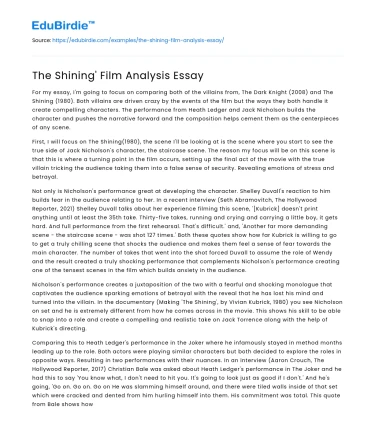For my essay, I'm going to focus on comparing both of the villains from, The Dark Knight (2008) and The Shining (1980). Both villains are driven crazy by the events of the film but the ways they both handle it create compelling characters. The performance from Heath Ledger and Jack Nicholson builds the character and pushes the narrative forward and the composition helps cement them as the centerpieces of any scene.
First, I will focus on The Shining(1980), the scene I'll be looking at is the scene where you start to see the true side of Jack Nicholson's character, the staircase scene. The reason my focus will be on this scene is that this is where a turning point in the film occurs, setting up the final act of the movie with the true villain tricking the audience taking them into a false sense of security. Revealing emotions of stress and betrayal.
Save your time!
We can take care of your essay
- Proper editing and formatting
- Free revision, title page, and bibliography
- Flexible prices and money-back guarantee
Not only is Nicholson's performance great at developing the character. Shelley Duvall's reaction to him builds fear in the audience relating to her. In a recent interview (Seth Abramovitch, The Hollywood Reporter, 2021) Shelley Duvall talks about her experience filming this scene, '[Kubrick] doesn't print anything until at least the 35th take. Thirty-five takes, running and crying and carrying a little boy, it gets hard. And full performance from the first rehearsal. That's difficult.' and, 'Another far more demanding scene - the staircase scene - was shot 127 times.' Both these quotes show how far Kubrick is willing to go to get a truly chilling scene that shocks the audience and makes them feel a sense of fear towards the main character. The number of takes that went into the shot forced Duvall to assume the role of Wendy and the result created a truly shocking performance that complements Nicholson's performance creating one of the tensest scenes in the film which builds anxiety in the audience.
Nicholson's performance creates a juxtaposition of the two with a fearful and shocking monologue that captivates the audience sparking emotions of betrayal with the reveal that he has lost his mind and turned into the villain. In the documentary (Making 'The Shining', by Vivian Kubrick, 1980) you see Nicholson on set and he is extremely different from how he comes across in the movie. This shows his skill to be able to snap into a role and create a compelling and realistic take on Jack Torrence along with the help of Kubrick's directing.
Comparing this to Heath Ledger's performance in the Joker where he infamously stayed in method months leading up to the role. Both actors were playing similar characters but both decided to explore the roles in opposite ways. Resulting in two performances with their nuances. In an interview (Aaron Crouch, The Hollywood Reporter, 2017) Christian Bale was asked about Heath Ledger's performance in The Joker and he had this to say 'You know what, I don't need to hit you. It's going to look just as good if I don't.' And he's going, 'Go on. Go on. Go on He was slamming himself around, and there were tiled walls inside of that set which were cracked and dented from him hurling himself into them. His commitment was total. This quote from Bale shows how dedicated Ledger was when it came to his roles. And through his performance, you can see this dedication. The chilling performance he delivers rivals the anxiety and tension the audience feels during The Shining. This shows the different approaches an actor can take when dealing with a role.
A scene where I feel this is shown best is during 'the interrogation scene of The Dark Knight where you see a long interrogation between Batman and the Joker. Christopher Nolan uses this scene to show that Joker is Batman's biggest enemy to date by showing Bale genuinely afraid of the man he is up against. Ledger's approach to this scene was mentioned in the same quote by Bale, 'He was slamming himself around, and there were tiled walls inside of that set which were cracked and dented from him hurling himself into them. His commitment was total. Ledger was throwing himself at walls injuring him to achieve the best possible performance for the audience. It shows, as his performance has left a long-standing impression on everyone and is still talked about to this day.
In the same interview ((Aaron Crouch, The Hollywood Reporter, 2017), Ledger speaks on why he chose the role,' if Tim Burton was doing The Dark Knight and asked me to play the Joker I wouldn't have taken it. Because to try and even touch what Jack Nicholson did in Tim Burton's world would be a crime.' here he mentions Nicholson for another role where he also played the Joker in Batman (1989). This shows he has respect for Nicholson and sees him as a very talented actor going as far as to say he would turn down the role if the same director, Tim Burton, was filming The Dark Knight. We can infer from this that Ledger wants to bring an original performance to a character and make it his own without relying on the previous performances from another actor. Which in turn created a compelling villain that changed the way the audience felt about the character with feelings of anxiety and tension similar to what they felt when they watched The Shining in 1980.






 Stuck on your essay?
Stuck on your essay?

